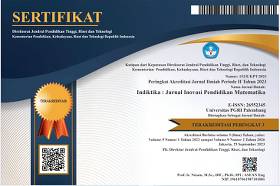Pengembangan LKPD Berbasis Problem-Based Learning (PBL) untuk Memfasilitasi Kemampuan Literasi Matematis Siswa
DOI:
https://doi.org/10.31851/indiktika.v5i1.9840Keywords:
LKPD, literasi matematis, problem-based learningAbstract
Produk berupa LKPD berbasis problem-based learning untuk memfasilitasi kemampuan literasi matematis siswa yang dihasilkan dalam riset ini dilakukan dengan metode penelitian dan pengembangan (RND). RND dilakukan dengan model ADDIE. Subjek yang digunakan dalam riset ini adalah siswa kelas VIII dan IX MTs Negeri 5 Serang. Instrumen tes dan non tes yang digunakan dalam riset ini dianalisis dengan menggunakan teknik analisis data kualitatif dan kuantitatif. Pengujian skala terbatas dilakukan untuk mengukur kelayakan draf awal LKPD berdasarkan aspek bahasa, ketertarikan, dan kepraktisan LKPD. Selanjutnya, pengujian validasi ahli dilakukan terhadap 2 ahli media pembelajaran dan 2 ahli pendidikan matematika. Sedangkan untuk mengetahui peningkatan kemampuan literasi matematis, siswa diberikan instrumen pretes dan postes. Kesimpulan yang diperoleh berdasarkan uji validasi kelayakan LKPD yaitu: rata-rata skor uji validasi ahli media pembelajaran sebesar 90%, serta rata-rata skor uji validasi ahli pendidikan matematika sebesar 92%. Selain itu, skor kemampuan literasi matematis siswa mengalami peningkatan. Adapun gain yang dihasilkan pada uji lapangan ini adalah sebesar 0,73.
References
BPS. (2022). Badan Pusat Statistik. Badan Pusat Statistika. https://www.bps.go.id/pressrelease/2022/11/15/1931/indeks-pembangunan-manusia--ipm--indonesia-tahun-2022-mencapai-72-91--meningkat-0-62-poin--0-86-persen--dibandingkan-tahun-sebelumnya--72-29-.html
Corcoran, E. (2005). A Statistical Model of Student Knowledge for a Corrected Conceptual Gain. University of Arkanas.
Hamzah, A. (2021). Metode Penelitian & Pengembangan (Research & Development) Uji Produk Kuantitatif dan Kualitatif Proses dan Hasil Dilengkapi Contoh Proposal Pengembangan Desain Uji Kualitatif dan Kuantitatif. Malang: Literasi Nusantara Abadi.
Kaiser, G., & Willander, T. (2005). Development of Mathematical Literacy: Results of an empirical study. Teaching Mathematics and Its Applications: An International Journal of the IMA, 24(2-3), 48-60.
Khotimah, K. (2018). Meningkatkan Kemampuan Literasi Matematis dengan Pendekatan Metacognitive Guidance Berbantuan GEOGEBRA. GAUSS: Jurnal Pendidikan Matematika, 1(1), 53-65.
McCrone, S. S., & Dossey, J. A. (2007). Mathematical Literacy--It’s Become Fundamental. Principal Leadership, 7(5), 32-37.
Meissner, H. (2015). Creativity in mathematics education. Proceedings of the 12th International Congress on Mathematical Education, 591-592. Springer, Cham.
Nasoha, S. R., Araiku, J., Pratiwi, W. D., & Yusup, M. (2022). Kemampuan Numerasi Siswa Melalui Implementasi Bahan Ajar Matematika Berbasis Problem Based Learning. Indiktika : Jurnal Inovasi Pendidikan Matematika, 4(2), 49-61.
OECD. (2013). OECD Skills Outlook 2013: First results from the survey of adult skills. http://www.oecd-ilibrary.org/education/oecd-skills-outlook-2013_9789264204256-en
Ojose, B. (2011). Mathematics literacy : Are we able to put the mathematics we learn into everyday use?. Journal of Mathematics Education, 4(1), 89-100.
Ramadhani, Y. R., Masrul, M., & Rani, R. (2020). Metode dan Teknik Pembelajaran Inovatif. Medan: Yayasan Kita Menulis.
Rayanto, Y. H. (2020). Penelitian Pengembangan Model Addie dan R2d2: Teori & Praktek. Pasuruan: Lembaga Academic & Research Institute.
Rohana, Hartono, Y., & Nugraha, I. A. (2021). Pengaruh Model Pembelajaran Creative Problem Solving Terhadap Kemampuan Literasi Matematis Siswa SMA. Indiktika : Jurnal Inovasi Pendidikan Matematika, 3(2), 169-179.
Sari, F. A., Yandari, I. A. V., & Fakhrudin. (2017). The Application of Problem Based Learning Model to Improve Mathematical Literacy Skill and The Independent Learning of Student. Journal of Physics: Conference Series, 812(1), 012013.
Schettino, C. (2016). A Framework for Problem-Based Learning: Teaching mathematics with a relational problem-based pedagogy. Interdisciplinary Journal of Problem-Based Learning, 10(2), 12.
Schleicher, A. (2019). PISA 2018: Insights and interpretations. OECD Publishing.
Stacey, K. (2011). The PISA View of Mathematical Literacy in Indonesia. Journal on Mathematics Education, 2(2), 95-126.
Warniatun, W., & Junaedi, I. (2020). Mathematical Literacy Ability of 8th Graders in Problem Based Learning with Think Talk Write Approach. Unnes Journal of Mathematics Education, 9(2), 129-139.
Wulandari, E., & Fitrianawati, M. (2022). Lembar Kerja Peserta Didik Kelas V pada Materi Geometri Berbasis Etnomatematika. Indiktika : Jurnal Inovasi Pendidikan Matematika, 4(1), 73-82.
Downloads
Published
Issue
Section
License
Copyright (c) 2022 Khotimah Khotimah, Kurotul Aini

This work is licensed under a Creative Commons Attribution-ShareAlike 4.0 International License.
This work is licensed under a Creative Commons Attribution-ShareAlike 4.0 International License.
Authors who publish with this journal agree to the following terms:
- Authors retain copyright and grant the journal right of first publication with the work simultaneously licensed under a Creative Commons Attribution License that allows others to share the work with an acknowledgement of the work's authorship and initial publication in this journal.
- Authors are able to enter into separate, additional contractual arrangements for the non-exclusive distribution of the journal's published version of the work (e.g., post it to an institutional repository or publish it in a book), with an acknowledgement of its initial publication in this journal.
- Authors are permitted and encouraged to post their work online (e.g., in institutional repositories or on their website) prior to and during the submission process, as it can lead to productive exchanges, as well as earlier and greater citation of published work.












